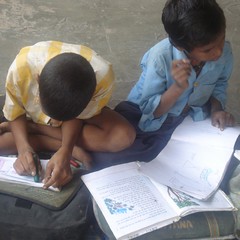 The Right Education bill has cleared one more hurdle. A short news item on October 31st stated that the Cabinet had given its not to the Education Bill. It was about time!
The Right Education bill has cleared one more hurdle. A short news item on October 31st stated that the Cabinet had given its not to the Education Bill. It was about time!
For those who are not aware it was in 2002 that the 82nd Amendment made education a fundamental right of all children between 6 and 14. It was indeed a wow moment. The draft bill was then elaborated and debated. In July 2006 the government rejected the bill for lack of resources and the voiceless children of India were once again betrayed.
In February 2008 the Government finally accepted to take on the Bill. It was approved by the cabinet only in October.
If one peruses the twists of the tale it boils down to it is all about money honey! Everyone from the planning commission to the state governments find the financial burden to heavy to bear. never mind the millions easily spent to create new facilities to accommodate candidates from reserved categories to higher places of learning, ensuring that all the children of India go to school is not a priority. Who cares about them. The sad reality is that they are not a vote bank or a good cause to espouse. They remain voiceless and neglected. Needless to say we are referring to children of the other India, the one of the have nots. Their peers on the other side of the fence acquired their right to education long ago.
And who would you ask are the main the detractors of the Bill: surprisingly or not the private school lobby who opposes the fact that hey have to reserve 25% or more of their seats to poor students. The idea was to bridge the gap between rich and poor and ensure that all children get equal opportunities. Something many countries.
For one who has always dreamt of a common neighbourhood school, this indeed was a first step, albeit a faulty one, in the right direction. One no waits to see what happens to the Bill as its journey is still not ever. It may just get referred once again to a Committee.
The Right to education Bill has already completed five years of struggle. A long one for any Bill particularly when some get voted in no time, particularly those that can be political fodder or those that vote for raises in salaries of parliamentarians. Five years means that many children who could have benefited from it have now moved beyond the stipulated 6 to 14 years ans are now probably working in some dark corner of our land, their morrows hijacked.
True that there are many contentious issues in the Bill that need to be addressed: why 6 to 14 ? what happens to children below 6? 14 does not give you any school leaving validation? why should parents be held responsible? who will the Bill be implemented etc. But experience shows that Bills can be amended even after they are passed so perhaps one should pass it.
The children of India deserve the right to Education
But then one may softly ask: whose right is it anyway?Labels: common school
 The Right Education bill has cleared one more hurdle. A short news item on October 31st stated that the Cabinet had given its not to the Education Bill. It was about time!
The Right Education bill has cleared one more hurdle. A short news item on October 31st stated that the Cabinet had given its not to the Education Bill. It was about time!